Search the Special Collections and Archives Portal
Search Results
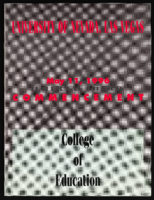
University of Nevada, Las Vegas (UNLV) College of Education 33rd commencement program
Date
Archival Collection
Description
Commencement program from University of Nevada, Las Vegas Commencement Programs and Graduation Lists (UA-00115).
Text
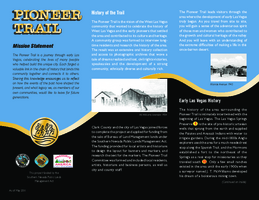
Brochure, Pioneer Trail of West Las Vegas community
Date
Archival Collection
Description
Brochure highlights and maps historic points of interest in West Las Vegas.
Text

Meeting minutes for Consolidated Student Senate, University of Nevada, Las Vegas, January 21, 1975
Date
Archival Collection
Description
Text
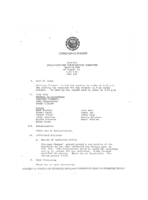
Meeting minutes for Consolidated Student Senate, University of Nevada, Las Vegas, August 09, 1983
Date
Archival Collection
Description
Text

Transcript of interview with Eva Garcia Mendoza by Elsa Lopez and Barbara Tabach, September 25, 2018
Date
Archival Collection
Description
On the corner of 7th street and Clark, and beside the tennis courts of Las Vegas Academy, stands the law office of attorney Eva Garcia Mendoza. Eva has worked in her office since 1982, and in this time she has helped the Las Vegas community work through civil and immigration cases besides aiding in a myriad of other ways. Eva Garcia Mendoza was born in 1950, in the town of McAllen, TX-an environment that perpetuated hatred of Mexican Americans. Eva recalls the racism she endured; for instance, being spanked if she spoke Spanish in school, and her family facing job discrimination because of her skin color or her last name. Being an ethnic and financial minority was difficult, and Eva remembers nights as a child when she would cry herself to sleep. Eva showed resilience in the face of adversity as she states, “you rise to the level of your teachers’ expectations.” With the encouragement of her band professor, Dr. L.M Snavely, she began higher education at Pan American College. She moved to Las Vegas in 1971 and began to work before being accepted at UNLV to study Spanish literature. She graduated in the class of 1973. In 1975, Eva applied to become a court interpreter, a decision that would drastically change the trajectory of her career. She earned the coveted position and began to work beside Judge John Mendoza who was the first Latino elected to public office in the state of Nevada. Several years later John and Eva would wed. Judge Mendoza passed away in 2011. Eva talks about how extraordinary his legacy is-from his professional achievements to a story about his v football days and the 1944 Dream Team, this true story even piqued the interest of Hollywood writers. Through her work, Eva began to notice how she was more than qualified to become a lawyer herself, so she applied and gained a full ride scholarship to the Law School of San Diego University. Eva describes the struggles of attending school in San Diego while her spouse and children were home in Las Vegas. Despite the financial difficulties, being one of few minority students, and becoming pregnant her second year, Eva was able to finish her remaining university credits by returning to Las Vegas and working with Judge Mendoza. Together, they started the Latin Bar Association. Eva began her own practice in 1981 and would later partner with Luther Snavely, who was the son of her band teacher that helped her to attend college so many years back. Today, Eva has a new partner at her office and hired her son to work as a secretary. Eva also tells of the office’s mysterious history, of which includes a ghostly figure many clients claimed to have seen in the reception room. Eva recounts many of her professional achievements, such as petitioning to start the American Immigration Lawyers Association, Nevada Chapter, representing celebrities, winning the unwinnable cases such as against the Nevada Test Site. Eva talks about current events, such as today’s immigration laws, the discriminatory practices of revoking birth certificates from those born in Brownsville, TX., and about the importance of the #MeToo movement. Eva and her family have a great fondness for Las Vegas. The support for the Latinx community in Las Vegas greatly contrasts that which she experienced as a child in southern Texas. She describes wanting to take her children and grandchildren to visit her old home in McAllen, TX where her family grew up on the “wrong side of the tracks.”
Text
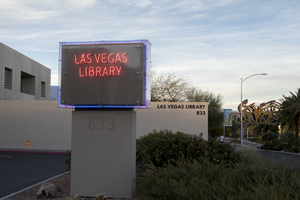
Photographs of Las Vegas Library sign, Las Vegas (Nev.), March 3, 2017
Date
Archival Collection
Description
Site address: 833 N Las Vegas Blvd
Sign owner: City of Las Vegas is the owner of the property since 2015, but it is an Independent government agency ran by a board of trustees chosen by the city and county
Sign details: Opened since 1990. Used to be paired with the Lied Children's Discovery Museum but has been solely the library since the Children's Discovery museum moved to its new location in 2013. The Library property was sold to the city of Las Vegas October 2015.
Sign condition: 4-Lights up very brightly at night and the graphics are still relatively visible during the day, but the Lexan covering makes it a little cloudy looking during the day.
Sign form: Small rectangular roadside sign
Sign-specific description: Rectangular sign about 4ft by 3.5 feet but raised off the ground by nearly 7-8 feet. Double sided slate of concrete with painted font stating "Las Vegas Library". The letter light up red (neon) at night and the border of the sign is blue (argon)
Sign - type of display: Neon
Sign - media: Concrete
Sign - non-neon treatments: Lexan to cover the Neon tubing
Sign environment: Across the street from Cashman Field. Located in the Cultural Corridor about a mile north of Fremont St. near the beginning of North Las Vegas.
Sign manufacturer: Fluresco Lighting and Sign
Sign - date of installation: 43143
Sign - date of redesign/move: Pre 2012- there was a roadside sign for the children's museum and library but no neon features on that sign.
Sign - thematic influences: Basic skeletal neon, but great use of Neon and Argon. Also the use of concrete as the background is very interesting and not seen as commonly as steel or wood backings for signs.
Sign - artistic significance: This sign shows that any type of company or property here in Las Vegas can have a Neon sign, thus perpetuating the culture of Las Vegas and how Neon defines the town.
Survey - research locations: Las Vegas Sun Article https://lasvegassun.com/guides/about/public_libraries/ , Clark County Library website http://www.lvccld.org/about/branch_info.cfm?id=4 , Discovery Children's museum website https://www.discoverykidslv.org/ , contact with Stephen Rice the Library's General Services Director
Survey - research notes: The building is defined by the tall cylinder tower that used to be an observatory for the Children's museum.
Surveyor: Emily Fellmer
Survey - date completed: 2017-08-04
Sign keywords: Neon; Concrete; Roadside
Mixed Content
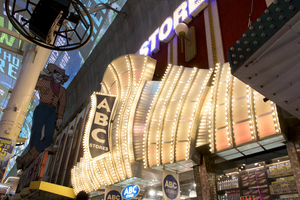
Photographs of ABC Stores sign, Las Vegas (Nev.), March 3, 2017
Date
Archival Collection
Description
Site address: 23 Fremont St
Sign owner: Sidney and Minnie Kosasa
Sign details: The idea of the ABC stores originated in Hawaii with their first store opening in Waikiki in 1964 as a traveler convenience store selling groceries, cosmetics and souvenirs. The company now has location here in Las Vegas as well as Guam and Saipan. The owners wanted a name that everyone could remember so they named it ABC. The building that houses this ABC Store on Fremont was originally constructed in 1940. The property opened as the ABC Stores in November of 2001.
Sign condition: 5- relatively new and in good condition.
Sign form: Flat bullnose sign, though nearly a canopy sign
Sign-specific description: Above their entrance are big silver plumes that are all lined with chasing incandescent. At night these plumes look like a iridescent pearl color. There is one big plume in the middle and two on either side of the big one. On the middle plume there is a blade sign stating "ABC (vertically) Stores (horizontally)" which is also lined in incandescent on the roadside portion of the sign. The blade portion is a backlit plastic sign. Above the silver plumes is "ABC STORES" in channeled block font letters. These letters are outlined in blue neon (argon) and have gold colored incandescent that are flashing.
Sign - type of display: Neon, incandescents and backlit plastic signs
Sign - media: Plastic and steel
Sign - non-neon treatments: Neon, incandescents and backlit plastic signs
Sign animation: Chaser for the incandescents on the plumes and flasher on the incandescents in the ABC letters above the plumes.
Sign environment: This property is on Fremont in between Main and First Street. To the east would be the site of the old Famous Pioneer Club and La Bayou was to the west, but has been torn down in the past year. Across the street was the Glitter Gulch.
Sign manufacturer: YESCO
Sign - date of installation: 2001
Sign - thematic influences: The plumes that this location has look very similar to the 1970's Raul Rodriguez Flamingo feathers.
Sign - artistic significance: Could be reminiscent of the 1970's Flamingo Feathers designed by Raul Rodriguez. Though it is also remnant of the old showgirl outfits with their plumes and big feathery outfits.
Survey - research locations: ABC website http://www.abcstores.com/about/ , Acessor's Page, contact with Lovella Joy C. Romulando the Assistant Property manager.
Surveyor: Emily Fellmer
Survey - date completed: 2017-09-01
Sign keywords: Neon; Incandescent; Backlit; Plastic; Steel; Chasing; Flashing; Bullnose
Mixed Content

Transcript of interview with Harvey N. Dondero by Elizabeth N. Patrick, August 9, 1984
Date
Archival Collection
Description
Text
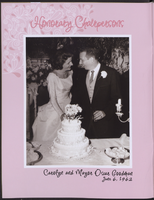
Program for The Wedding event at Temple Beth Sholom, June 6, 2010
Date
Archival Collection
Description
Booklet for the Wedding celebrations and vow renewals of couples at Temple Beth Sholom.
Text

Transcript of interview with Norman Christiansen by James Courtney, November 28, 1986
Date
Archival Collection
Description
Text
